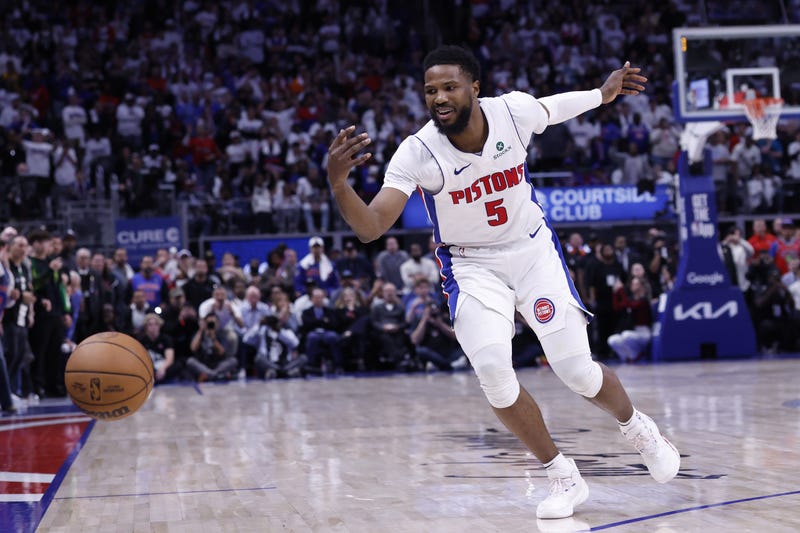
Malik Beasley could have completed the play in his sleep. It required nothing but muscle memory, catch, shoot, splash. It was the film reel of his season, and now the season came down to this, the clock ticking toward zero, the Pistons down three, the ball coming Beasley's way, the defense bent out of shape: an open look to send the game to overtime and extend the Pistons' dream for at least another five minutes. Maybe for another game. Another series.
The pass from Cade Cunningham, clean as can be, slipped through Beasley's hands and wound up in the crowd. The air fizzled from the arena, popped like a balloon. The Knicks celebrated, having escaped to the second round. The Pistons slumped their shoulders, put their hands on their heads, stared up at the rafters.
"Had an opportunity to tie the game," Beasley said after Detroit's 116-113 loss that ended its season. "Mad about that. Sucks."
Asked if he had any regrets about the way it ended, the most prolific three-point shooter in the East this season sighed and said, "Catch the ball, make a three. What else?"
"We had the lead in the fourth quarter, I think we could have been better at executing," Beasley went on. "But all that doesn’t matter. Like I said, a hell of a year."
Doesn't matter because it can't be changed, and because it doesn't change what the Pistons accomplished this season. Beasley was as crucial as anyone not named Cunningham to their historic turnaround, the first NBA team ever to triple its win total from the season prior (over 82 games). He arrived last summer as a journeyman trying to prove he was worth more than a one-year, $6 million deal, chump change in the NBA. The Pistons went into the season as a punching bag. Then they started punching back.
"You’re going to have to knock us down as many times as we get up, because we’re going to keep fighting," Beasley said prior to Game 6. "We’re going to keep punching. That’s our game."
The Knicks led by 14 at the end of the first quarter, but the Pistons stormed back to take the lead at halftime -- on a buzzer-beater by Beasley, who went 6-for-13 from three on the night. The Knicks went back up by 11 in the fourth quarter, and here came the Pistons on a 13-0 run to reclaim the lead with 5:30 to play. Little Caesars Arena, which rocked and roared for three games unlike any building Beasley has experienced in the playoffs, was in a full-throated lather.
"The crowd was hype, they had our back," Beasley said. "Next year we gotta make sure we protect home court."
Detroit led by seven with 2:35 to play, Game 7 within reach. New York scored 11 of the final 12 points, the dagger a game-winning three by Jalen Brunson. It could have been Ausar Thompson who stopped him. It should have been Beasley who answered. It would have been a different outcome. As Beasley lamented later, "AT was pissed, he believes that he’s the best defender in the world, he felt like he should've got a stop on the last possession."
"I’m the best shooter in the world, I felt like I should’ve got a shot on the last possession," he said.
As much as it pained him, Beasley didn't want to dwell on it. His prevailing sentiment as he reflected on the last year was gratitude. His next was pride. The disappointment was real, but it wasn't blinding. Beasley and the Pistons plan to be back. As he sauntered down the hallway outside the media room a few minutes later while Cunningham spoke with reporters, Beasley banged on the glass with a grin. Cunningham smiled, nodded back and said, "My dog."
"In my whole nine years in the NBA," Beasley said, "I’ve never had this much fun coming to the gym. I’ve been through a lot of stuff just this year alone, and every day coming in was probably the best thing that happened to me. ... I think that’s what took us to another level, I think that’s what brought us here today, is our energy and our togetherness. We just gotta keep running with that."
J.B. Bickerstaff and president of basketball ops Trajan Langdon infused a sagging organization with spirit. They made the Pistons' practice facility "a place where you want to be," said Beasley, likening Bickerstaff to "that cool uncle" as much as a coach. Beasley was part of their plan himself, peppy and unapologetic, and infectiously positive. He lifted the Pistons with his glee as much as his threes, punctuating makes with his patented shimmy -- and occasionally being scolded by Bickerstaff, he smiled, to get back on defense.
A free agent this summer, Beasley doesn't plan on leaving. Detroit, he said, is where "I want to be."
"To be able to perform in front of the city is huge," said Beasley.
It's his mom's hometown. It's where he spent a lot of his summers growing up. It's where he just had the best season of his career, averaging 16.3 points off the bench, shooting over 41 percent from three, playing in all 82 games and finishing second for Sixth Man of the Year, an award he should have won. Beasley will rue his performance in the playoffs when he shot just 33 percent from deep, in a series where a couple more makes could have been the difference.
But to borrow Beasley's words, all that doesn't matter. What matters is what comes next. The Pistons say they'll be back. Assuming Beasley is back with them, he'll have plenty of chances to leave a bobbled pass in the past.
